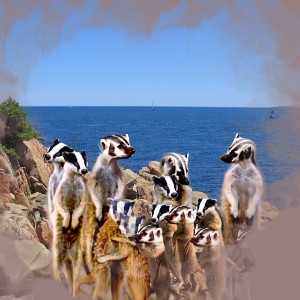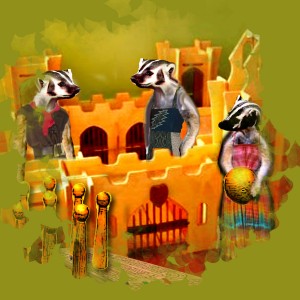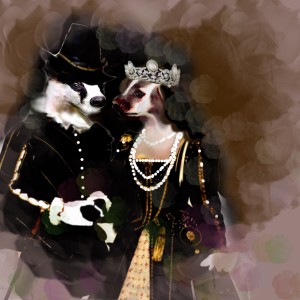
Why I need coffee in the mornings…
So this was one of those long dreams, where the story shifts around a lot. It started out being simply a dream about clothes I used to own – I have those dreams a lot – and then it was about decorating t-shirts for some kids in a Sunday school class. We were drawing animals on the shirts, and this one little boy asked me to draw a badger. I couldn’t remember what a badger looked like, and all the books in the library only had cartoon badgers, like our college mascot.
Then it seemed that we – “we†meaning pretty much everyone I know – were staying at a beach house. The beach seemed more like Maine than North Carolina – cool and shady beneath the trees; rocky coastline.  And someone said there were a bunch of badgers down on the rocks, so we all went down to look.
So, in my dream, they were meant to be badgers, but they stood up like meercats or prairie dogs, and they lived in the water and sunned on the rocks like seals… or perhaps more like otters.
 They were all standing there in a group, being unbelievably cute, and making all sorts of strange little noises. Some of the noises sounded almost like words. Then they started making a noise that really sounded for all the world like the word “hello.â€
They were all standing there in a group, being unbelievably cute, and making all sorts of strange little noises. Some of the noises sounded almost like words. Then they started making a noise that really sounded for all the world like the word “hello.â€
“Hello!†we called down. “Hello,†they repeated. After several minutes of this it really seemed a bit eerie. Surely they were actually saying hello. So we went slowly down to the rocks, so as not to scare them off. “Can you say anything besides hello?†I asked one. “Yes!†she shouted, and then all the badgers sort of giggled. Which was also pretty weird. I held out one finger and the badger who spoke to me “shook hands†with her tiny paws. “I’m very glad to meet you,†I said, and then everyone was talking to the badgers, and we invited them back up to the house.
On the path back uphill to the house, the badgers turned into people. They were odd-looking, like refugees from a cheap Renaissance Fair, and they were all very young – teens, mostly, and some children. It was hard to tell if they were meant to be some kind of cultural ambassadors or if they were going to get into trouble for talking to us. They seemed excited to meet us but a little hesitant to talk about themselves much. They were very interested in the house, and four teenage girl-badgers went into one of the bathrooms to play with the mirrors and lights and brushes and soaps. Someone asked me what was going on, and I shrugged and said “Four badger girls have gone into the restroom to fix their hair.â€Â Then the conversation turned, earnestly and anxiously, to whether we ought to call them “badgers†or if that was racist. One person said it might be offensive; another said “How could it be? They are badgers.â€Â We decided that what we wanted was an adjective rather than a noun, like the difference between saying “Chinese men†rather than “Chinamen.â€Â If this was our first cultural exchange with a whole new race, we wanted everyone to get off on the right foot. I was thinking that the scientific Latin name for a badger might provide a useful term, and I figured I look it up later when I woke up.
So I did look it up, just now:Â badgers belong to the family Melinae, so we might have called them Melinaesian girls.
Anyway, by this time the house was seriously crowded. I’d gotten into a long conversation with Lauren, my pilates teacher, and one of the badgers who seemed to be a leader of the group. I think her name was Pippi: yesterday I was thinking about the Pippi Longstocking books and wondering if my friend’s 6-year-old would enjoy them; I’m sure that’s where the name came from. Anyway, Lauren and I were asking Pippi about her people and their culture, language, and history in general. We were a little shy about asking questions at first – we wanted them to feel welcome and not treat them like they were strange. And it was like having a conversation in a crowded party; we weren’t getting very far… especially since a lot of the younger kids, both human and Melinaesian, were just playing and romping all over the place. I wanted to ask if the adult badgers had jobs in the “real world†– if they were part of our society without our realizing it – or if they were living on the edges of society somehow. I mean, they had clothes. Where did they get them? Did they buy them? Find them on the beach? Make them? But it was awkward.
We walked into another room and found there was a whole gallery of badger games and toys. All the kids were playing happily, and I wanted very much to stop and take a closer look, but I didn’t want to loose Pippi in the crowd. The toys were wooden, simple in design, but fascinating and beautifully made. They were larger-scale than you’d expect: the board games were big enough to stand on; dice were about the size of grapefruit. All the games looked a little familiar but not quite the same as games we know. There was something like cribbage, something like checkers, something like ninepins, something shaped like a toy castle, something with rings to toss. My grandfather was there, and I wanted to ask him if he knew how to play any of the games – I had a feeling he probably did.
There was even a little restaurant serving ethnic badger food in little bowls. It smelled great, like some kind of savory stew. And then we came up to a pavilion where the King and Queen of the badger-people were seated, greeting guests. They were both lovely, dark haired, dressed in black velvet and pearls, grave and gracious.  I curtsied; Paul was there and making charming conversation with the Mesinaesian nobility. The King spoke to me – just a brief courtesy – and asked how I was. I told him it was the best day of my life and I was very honored to meet him.  But I was looking around for Pippi, because I still had a lot of questions, and then of course I woke up.


